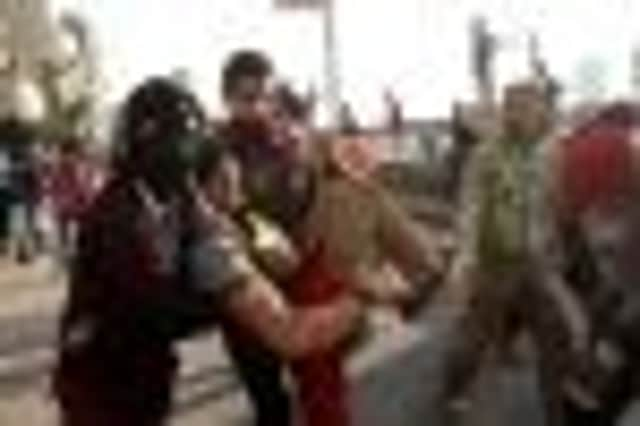Militia ‘won’t take over’ from Egypt’s police


Minister Mohammed Ibrahim was speaking yesterday, a day after protesters rampaged through Cairo, furious over the acquittal of seven of nine police officers in a trial over football violence that left 74 people dead last year. Some 21 civilians received death sentences in the highly charged trial.
Protesters torched a police club and the football federation HQ on Saturday. Hundreds of rioters battled police along the Nile boulevard in an area packed with hotels and diplomatic missions. Two people were killed. The clashes along the river continued yesterday.
Advertisement
Hide AdAdvertisement
Hide AdThere were also protests in Port Said, the city where the football stadium riot erupted in February 2012. The city was the scene of bloody clashes with police in the past week. They stopped this weekend after police evacuated their headquarters and the military took over.
The unrest coincides with an unprecedented wave of strikes by police over demands for better working conditions, as well as anger over alleged attempts by president Mohammed Morsi and his Muslim Brotherhood to take control of the police force.
Mr Ibrahim acknowledged that his force is under pressure, but he insisted he will not allow vigilante groups to take over the duties of the force.
“From the minister to the youngest recruit in the force, we will not accept to have militias in Egypt,” Mr Ibrahim said. “That will be only when we are totally dead, finished.”
His declaration followed a statement by a hard-line Islamist group that its members would take up policing duties in the southern province of Assiut because of strikes by local security forces. MPs have raised the possibility of legalising private security companies, granting them the right to arrest and detain.
Egypt’s police and internal security forces are widely hated, seen as a legacy of the rule of fallen president Hosni Mubarak, when they were notorious for abuses, torture and crackdowns on political opponents.
Mr Ibrahim said the strike is minor and is not affecting the capabilities of the force. Instead, dragging the police into the political dispute between the opposition and the ruling Islamists is exhausting the force, he said.
“I only ask all [political] forces to leave the police out of the political equation and the conflict that is taking place,” he said.
Advertisement
Hide AdAdvertisement
Hide AdHe said he is talking with the striking policemen, who, he said are demanding to be better armed.
He dismissed charges that Mr Morsi’s Muslim Brotherhood is dictating his ministry’s policies.
“There is no interference by anyone in the work of the ministry. Rest assured,” he told reporters.
He said “infiltrators” among the protesters target police with live ammunition, birdshot and petrol bombs, to draw the force into using violence.
In the country’s Islamist-led Shura Council, the upper house of the legislature, members criticised the striking police, accusing them of dereliction of duty and allowing chaos to spread. One called for a ban on strikes by police, while another accused former regime officials of conspiring to undermine Mr Morsi’s rule and hold on power.
“We are facing a very tight conspiracy that aims to destroy any legitimacy,” said Hassan Youssef Abdel-Ghaffour of the Muslim Brotherhood’s Freedom and Justice Party.
Since late January, the country has been hit by relentless street protests, mainly directed against Mr Morsi and the Brotherhood.